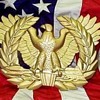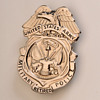Posted 10 years ago
 Chrisnp
Chrisnp
(310 items)
These items also came with the retired senior Army officer lot I’ve displayed in the last two posts. I’ve described the sword itself in the last post.
The gold/yellow sash has a hidden brass or brass plated clasp at the knot and a leather tab and keeper for adjusting the sash length. The interior appears to be satin. I’m not sure about the outside material, but it’s quite silky.
The under-garment sword belt seems designed to be worn under the sash and is a woven fabric over leather. The keeper slides to keep the belt tip in place. Metal is either brass or brass plated.
The dress hanger is the standard U.S. Army dress hanger normally prescribed for a matching dress belt that did not come with this lot. It’s made of gold wire thread and the branch color running up the middle, I believe indicating a company grade officer. I don’t believe pink is a branch color, so I think this color is faded from artillery red.
Originally I couldn't figure out who wore the sash, but thanks to RosaChan's help and some further research after she pointed me in the right direction, I believe the sash was worn by a general officer, pre-1917.
















![[S12-1-02] Japanese Sword: Koto Sukesada Katana in Koshirae FREE SHIPPING](https://i.ebayimg.com/images/g/-rsAAOSwiXFnXz4k/s-l225.jpg)


The U.S. War Department's Revised Regulations for the Army of the United States, 1861 detailed sashes and belts and the many variations worn by militia and volunteer units. According to the regulations, the sash had to be worn "on all occasions of duty of every description, except stable and fatigue." Regulation 1504 required the sash for general officers to be "buff, silk net, with silk bullion fringe ends; sash to extend around the waist, and to tie behind the left hip, pendent part not to extend more than eighteen inches below the tie."
The regulations called for a "medium or emerald green silk net" sash for medical officers; "crimson silk net" for ordnance, artillery, cavalry, and other officers; and a "red worsted sash" for sergeant majors, quartermaster sergeants, ordnance sergeants, hospital stewards, first sergeants, principal or chief musicians, and chief buglers.
A fancy dress uniform waist belt, usually called a sword belt, was in use before the Civil War. According to the 1861 regulations, officers were to wear a waist belt over the sash that was "not less than one and one-half inch nor more than two inches wide…the sword to be suspended from it by slings of the same material as the belt, with a hook attached to the belt upon which the sword may be hung."
For general officers, the belt was made of Russian leather and adorned with three stripes of gold embroidery. For all other officers and NCOs, the belt was plain black leather.
Officers and NCOs of the U.S. Navy and Marine Corps wore comparable sashes and sword belts. Officers and NCOs of the Confederate army and navy also wore them, when available. Navy uniform regulations in 1913 stipulated the design of the dress belt and straps. Captains and commodores wore a dress belt of "dark navy-blue silk webbing, backed by black grain leather, 13?4 inches wide, with seven gold stripes 1?16 inch wide," with the stripes in the center of the belt. Lieutenant commanders and others of lesser rank wore a similar belt with five stripes.
And admirals? The regulations called for a half-inch gold stripe embroidered on each edge and an eighth-inch stripe in between. The admiral of the navy wore a similar belt, though his was the only one authorized to be made from cloth.
I wonder how late the 1861 regulations were in effect. The lump created by the faux knot would make it awkward to wear a belt over this particular sash.
In full dress or while under arms the sword and scabbard are worn mounted from a cotton sword shoulder belt that is hung from the right shoulder to the left waist, and a red silk sash is worn round the waist. A breast plate is worn centered on the breast. This uniform is formal and is worn on parades and Honor Council Meetings by the color guard, Drum Major, Officer of the Day and Graduation .
The sword is also used for drills or less formal military formations, when it is worn on the cotton sword belt alone.
In 1841, the superintendent of the Academy ordered that sashes were to be worn with the sword. US Army generals continued to wear silk sashes in full dress until 1917 when this practice ceased in the US Army, but it has continued at the Academy.
.
http://www.twcenter.net/forums/showthread.php?384319-Useful-websites-covering-Uniforms-Flags-Naval-Maps-Downloadable-books-Orders-of-battle-Paintings-etc
If you copy and type the whole thread it has some threads of other webpages which will take you to time zones of military dress for most nations. It is time consuming but interesting. Hope you enjoy it.
Wow, that's quire a link! Good to know sashes were worn till 1917 by general officers. Although the officer who's estate I got this from would not have been flag grade in WWI, the item may have come from another family member or even the man he was an aid to.
That link is quite extensive and each one has other links etc. If you haven't discovered, clicking on a picture will enlarge it sometimes twice. Gives a better view of the dress. The third link down under Nations identifies various dress and off to the left you will see a search box etc. I like the list below which takes you from A-Z. Below is a similar sword that sold on e-bay. Also this link will take you to some pictures of hangers. http://www.usmilitariaforum.com/forums/index.php?/topic/43305-early-sword-hanger-for-the-m1902-sabre/
For your consideration, an antique 1902 Model Officer's sword and sword hanger. The gentleman who had this served in China prior to the Chinese Revolution (1911-1912).
Sword: The 1902 Model Officer's Sword is the first major turn from "combat" to "dress" style swords. It was intended to replace the Model 1872 Cavalry "Officers" Saber (a decorated version of the Model 1872 Cavalry "Troopers" Saber). The Model 1902 is very similar to European patterns of the time. This sword has a nickel-plated hilt and dark-brown wood grip which shows some damage on one side as shown in the photos. This sword has no maker markings. 32" blade length, overall length is 37 1/2"; nice standard etching design with "U.S." mid blade. Opposing side shows an eagle and E Pluribus Unum. Some minor pitting on the blade.
Scabbard: The sheath shows quite a bit of pitting overall and is slightly bent.
Hanger: The overall length of the chain hanger is 10 3/8" with the chain portion being 6 3/8". The chain is a figure 8 pattern.
Thanks for all your help RosaChan. As I think you know, my mystery was about who wore the sash, and with your helpfulness and some further research, I do believe this is a general officer's sash, pre-1917. I will update my post and mark it solved.
I do disagree however with the quote in post #6 that "The 1902 Model Officer's Sword is the first major turn from "combat" to "dress" style swords. It was intended to replace the Model 1872 Cavalry "Officers" Saber (a decorated version of the Model 1872 Cavalry "Troopers" Saber)."
If I were to edit this statement, I'd write that the 1902 sword was the final turn from "combat" to "dress" style swords, in that it was intended to replace both the model 1860 Staff and field officer sword and the Model 1872 cavalry officer's saber, both of which represented the first turns toward dress style swords.
Thanks for the love vetraio50, southcop, Harborguy, CindB, blunder, fortapache, officialfuel, Jewels and pw-collector
It's a pleasure to help solve clues but no expert on any of these things but love research.
You no doubt are very knowledgeable. There are so many eras, uniforms and nations and much credit to you for being so informed. Keep up the posting and very Happy Holidays.
RosaChan, The field of militaria is huge, and I only claim to be knowledgeable in some areas of it. Fortunately I’ve read enough and handled enough stuff to usually recognize where to direct my research when I don’t know an item. For this sash though I was looking in all the wrong places. I’m thankful for a fresh pair of eyes.
Chris